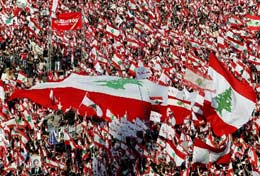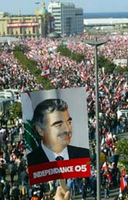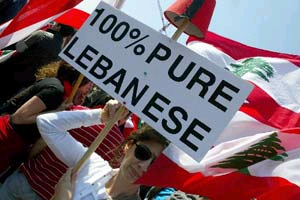
Thousands of Lebanese opposition protesters wave national flags
as they gather during a demonstration in Martyrs Square, central Beirut,
Lebanon, Monday March 14, 2005. Hundreds of thousands of Lebanese people
answered an opposition call for a massive protest to demand a full Syrian troop
withdrawal, resignations of security chiefs and an international investigation
into the death of former Premier Rafik Hariri. (Photo: Xinhua/AFP)


Above left: Lebanese opposition protesters carry portraits of
slain former Lebanese Prime Minister Rafik Hariri during a demonstration in
Beirut Martyrs square, Lebanon, Monday March 14, 2005. (Photo:
Xinhua/Reuters)
Above right: Lebanese opposition protester protests during a
demonstration in Beirut Martyrs square, Lebanon, Monday March 14, 2005. (Photo:
Xinhua/AFP)
Exactly one month after former Lebanese premier Rafik Hariri was
assassinated in a massive bombing attack, central Beirut was again awash with
unprecedented anti-Syrian emotions.
Hundreds of thousands of people, Sunni, Maronite Christian and Druze alike,
gathered in Martyrs Square in the capital center, brandishing red, white, green
Lebanese flags and chanting anti-Syrian slogans.
"Syria Out!" and "Sovereignty, freedom, independence!" were heard echoing
above the Mediterranean city and Hariri's posters seen waving in people's hands.
Angry Lebanese demanded an international investigation into Hariri's killing
and a complete and swift Syrian pullout of its troops and intelligence forces,
after a nearly 30-year military presence in its tiny neighbor.
Apart from the vast sea of opposition protesters in the square, steady flows
of people could be seen pouring from all corners of the city, and all kinds of
vehicles were bringing in large influx of people from across the country.
Estimates of the number of protesters varied from 1 million to 300,000.
The groundswell of public anger, which defied comparison both in scope and
scale, came after a mass pro-Syrian demonstration was staged last week,
organized by Damascus-backed Hezbollah, a Shiite political-cum-militia group.
Hezbollah supporters chanted anti-Washington slogans and thanked Syria for
its role in keeping stability and security in Lebanon. Syria sent its troops to
Lebanon in 1976 and acted as a powerbroker during its tiny neighbor's 1975-1990
civil war. The recent demonstrations and counter-demonstrations raised the
spectre of sectarian conflicts in Lebanon. The tense situation in the streets
forces Lebanese authorities to mull a ban on popular protests in an effort to
prevent peaceful demonstrations lapsing into violence.
The outpouring of anti-Syrian emotions was triggered by the assassination of
Hariri on Feb. 14. Hariri, a Sunni, was widely regarded as a major architect of
Lebanon's postwar revival and an opponent to Syria's influence.
Hariri fell out with Damascus when Syria threw weight behind a Lebanese
constitution amendment to extend presidential terms of incumbent Emile Lahoud, a
Damascus favorite.
Lebanese opposition accused Syria of playing a role in the killing plot, a
charge denied by Damascus.
Hariri's killing sent shock waves across Lebanon's political landscape,
leading to the resignation of Omar Karami's government on Feb. 28.
However, Karami was reappointed as prime minister shortly afterwards, partly
erasing the efforts by opposition to oust the pro-Syrian government.
SYRIA REDEPLOYS UNDER PRESSURE Under mounting international pressure, Syrian
President Basharal-Assad announced Saturday Syria would pull out the 14,000
troops and intelligence forces soon.
This latest Syrian commitment to a pullout was a result after UN special
envoy Terje Roed-Larsen held talks with Assad, urging him to implement the UN
Security Council Resolution 1559. The resolution, jointly sponsored by
Washington and Paris, was approved in September 2004, calling on foreign troops
to quit Lebanon and stop meddling in the country's internal affairs. The envoy
said he would report back to UN Secretary General Kofi Annan on details of a
pullout timetable.
The international community hoped the pullout of troops and security forces
could be conducted before Lebanon's elections in May.
Meanwhile, the first contingent of Syrian forces stationed in Lebanon pulled
back into the Syrian territories early Saturday. About 60 military vehicles
carrying some 1,000 Syrian soldiers in full uniform besides dozens of military
trucks loaded with equipment crossed the Jdaidet Yabous border checkpoint, 70 km
east of Beirut and 40 km west of Damascus.
The maneuver came one day after all Syrian troops completed withdrawal from
northern Lebanon.
Only one major intelligence office in Lebanon's second largest city of
Tripoli remained, said Lebanese security sources, adding it could pull out
within 24 hours.



